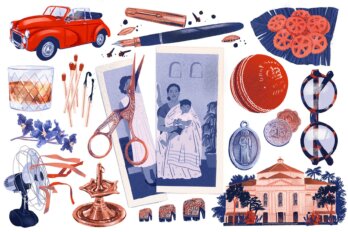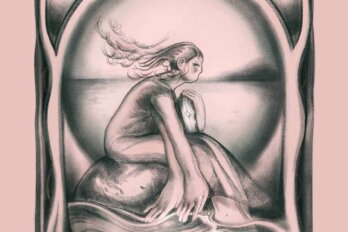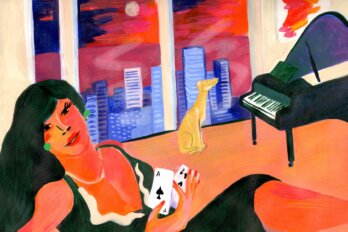The admittedly pretty rundown townhouse would sell better if the place could be shown and delivered essentially vacant. That had been the notion. The building’s good bones would be made evident, making it easier for a prospective buyer to dream.
Anyhow, the building belonged to a distant aunt of mine, a wealthy can-do woman who lived on another continent. And seeing as I lived on this continent, and was in a cash state that left me without a strong opinion on the tax code, I did not decline my aunt’s offer of living in the otherwise empty building, making myself available to show the place when opportunities arose, and just generally being there to make sure it was okay. I moved on in. The switch of neighbourhoods was somehow reason enough for me to stop seeing any friends. I didn’t sign up for cable and so had neither Internet nor television. And the radio, I don’t know, I’ve never liked it.
Living like that—at first it seemed a kind of luxury, but I guess I got a bit out of sorts. I remember a mid-morning when I was regretting an outfit of a particular pair of jeans and a brash yellow sweater, and then I stepped out to get the mail and realized I was in my undershirt and pajama shorts, realized that I’d never put on the regrettable outfit in the first place. Another afternoon, I found myself anxious about the upcoming election but then, walking past a particular poster, I realized that no, it was March and not October, and the election had been decided months earlier. I remember one Monday: I was under the impression that I had stocked the refrigerator with Armenian string cheese, too much of it, so much of it that I’d need to eat it at two meals a day for a full week in order to keep it from going to waste, and then I went to the refrigerator and found no string cheese there at all, just a sack of apples that I thought I’d only contemplated buying but then hadn’t.
That was the day I met my neighbour, Eddy. When he saw me there in the foyer, he kind of startled, birdlike. His hair was long and unwashed, and he was reading Being and Time, which didn’t immediately make me dislike him, maybe because I liked his hair and maybe because he carried it like it was a car repair manual. Actually maybe I startled first, before him.
I introduced myself as the niece of the landlady. I felt very nineteenth century doing that.
“Yeah, she’s so nice,” he said. “She’s letting me stay in my place a while longer.”
I figured he was lying, but I also don’t kick puppies. He went up the stairs. I went out the front door. Well, good, I thought to myself. In truth, I’d been kind of spooked living in that building all alone.
After that foyer meeting, when I’d hear all those noises that old buildings inevitably make, well, I would think to myself, oh, that must be Eddy, opening his door, flipping a light switch, pouring water over ramen noodles. Eddy looked through an old stamp collection, opened seltzer cans, caressed a fussy and small black cat I’d come to believe in. He creased pages in Being and Time, the only book—in my mind—that he had. Well, it wasn’t exactly love, but it was better than the emotions my mind had previously been coming up with to account for all those little sounds. I’d rather not go into those emotions.
A week or so later, I had a repeat of the phantom string cheese episode, except this time there was only one apple left in the fridge, and it didn’t look so great. I put on the brash yellow sweater that I’d not yet had the chance to regret in real life and ventured out. The repeat of the string cheese mistake had kind of given me a scare, and so I resolved to go farther than the corner grocery. About seven blocks away, I found a little family-run-looking gyro place. I went on in, making the bells that hung on the handle jingle as I did. The sound was as if somewhere an old-fashioned film strip needed to be advanced.
At the back of the shop, a man was pressing a waxed paper cup against the lever for a fountain Coke, and I really love fountain Coke, and maybe that’s why I found myself just walking straight over there, to right next to that man, to get myself a Coke—I could pay later, it seemed like that kind of place—and then that man—something about the tilt of his neck produced a tingle of recognition—mumbled “goddammit” as foam ran over the edge of his soda cup. Memories ambushed me: endless rounds of gin rummy, my dad drenched in sweat after a run wearing one of his button-up work shirts, a track made up of old tires submerged in a field, piles of pistachio shells. Sometimes I called up these little father memories on purpose, but they weren’t in the habit of arriving unbeckoned. That neck, that “goddammit”—they were familiar. But it couldn’t be my father; he’d been dead for more than a dozen years, a baker’s dozen, actually. But even if he’d been dead for just a day, it still would have been dead enough for it not to be him, there, cursing a soda machine.
I walked away from the soda machine. I went casually about my business, honest I did. I paid for my drink, ordered a gyro, paid for that, too, waited, and then, filled red plastic basket in hand, I looked around for a seat.
He did look just like my father. The way my father looked thirteen years ago, anyway. The man didn’t look a day older. In fact, it was even kind of a good hair day for that man, and my dad always looked a bit younger when his hair was on the greasy side—a little darker—and that was how this man was looking, with his now mostly emptied wax cup of fountain Coke. He was seated at a corner table. He half-smiled at me. Maybe I was staring.
He didn’t say my name, or call me beloved, or pumpkin, or ask me how I was doing, or say it’s been a long time, hasn’t it? He just said to me, lightly, “You should sit here.” I don’t know, maybe I looked cute, in that brash yellow sweater.
So I sat. Some spilled yogurt sauce on our table glistened as if reflecting the peaks of the sunken city of Atlantis; stray salt crystals caught the fluorescent light of the place and reflected it back at angles both bacchanalian and kind of like the spinning of a child’s mobile. Or at least that was my mood. My father pawed some napkins, wiped his forehead with them; onions always made him sweat.
Say something! I admonished myself.
I asked him if he lived nearby.
“Sort of,” he said. Then, “Not really.” Then “Not originally.” Then he left. Those bells on the doorknob rang as he exited.
Had I slipped through a wormhole of time? An ad poster on the wall showed a blonde woman with ’80s bangs leaning in to take a bite of gyro while a caption offered pronunciation guidance. But it was hard to feel the faded poster could be taken as evidence; all the gyro places I’ve ever known have seemed outdated.
That night, Eddy paced his apartment. A creaking that increased in pitch, then decreased. Increased, then decreased, like the breathing of an enormous man. He was wondering, I decided, what he should give to me.
The next day, without planning to, I met my father again, at the gyro place. When I walked in, that chain of bells jingled so beautifully. Much more beautifully than the day before. I thought of the underwater warbling of sirens. “It’s nice to see you again,” my dad called out across the narrow restaurant.
I ordered a beer with my lunch, which I never do. I got a Coke, too.
His hair didn’t look quite as good as it had the day before. But when I asked for the yogurt sauce bottle and he passed it to me, I found myself thinking of the vast distances between nuclei and electrons, the tremendous nothingness of matter, the dizzying transformation of energy, and how magnificent a feat this was, my father passing the yogurt bottle. Weren’t ghosts supposed to be immaterial? He was amazing. An amazing man. But then, as opposed to ghosts, there was also the undead, they probably had different moving abilities. Truth is, no one knows, I guess.
The third day, I found my father again, same table. Somehow we got to talking about gin rummy, and I guess I invited him over to play for a bit. We played cards for hours and hours, until late in the night. And what was weird was that it was very normal. And what was also weird was that the whole building that night seemed to be teeming with life: laughter in the stairwell, cloppity footsteps, music. Eddy was having a party? It kind of creeped me out, all that life. My undead father didn’t scare me, but life in general—the living—I find kind of terrifying.
You know, an old friend of mine, Becky, once told me a story of having roomed in a haunted house. She’d heard that everyone who’d stayed there had been haunted. There’d once been a suicide. Anyhow, Becky was dreading the haunting. Then one night it came. A doorknob rattling, a low moaning sound… the whole works. But then that was it. Just that one visit, that one night. Never again. And she thought, Ghost, why did you leave me?
Anyway, that next morning, the one clock in my place stopped. It wasn’t a fancy grandfather clock, or a charming old windup, or a pocket watch on an old brass chain. Just this little LED thing of mine, which has worked for years and years, survived many a power surge, many a move.
I felt a little sad. But having no idea what time it was gave me a valid excuse to seek out Eddy. I could ask Eddy about the time. Just about that. I wasn’t thinking that I’d tell him about my father, definitely not, because it wasn’t as if Eddy and I knew each other well. I guess I don’t know anyone that well.
I heard footsteps on the other side of Eddy’s door on the fourth floor, and I knocked. The footsteps abruptly stopped. There was no answer. “Eddy? ” Was he worried I would complain about the noise from the party? “Eddy? It’s just that my clock stopped working.” Nothing. Maybe he thought I was going to try to kiss him. Maybe that was his version of a nightmare. Or, I don’t know, maybe a dream. Maybe something he really wanted and therefore was afraid to take. I knocked one more time. More nothing.
Well, people have moods, that’s certainly something I know first-hand. I try not to judge. I went back down the stairs. For a bit, the quiet was, well, deafening, but eventually—obviously I don’t know after how long—the pacing upstairs resumed. Other odd noises, too. Squeaks. A couple of chirrups. Something that sounded like newspapers being folded.
Eventually—the sun was still high—I walked out to the gyro place. When I entered, those bells jangled in a mediocre way. That soda fountain was there, also the smell of fresh-cut onions. But my father wasn’t there. I still haven’t seen him again. Nor have I seen Eddy. It’s only been twenty-two weeks or so, though. And the other morning I thought there was string cheese in the refrigerator, and then there it was, actually there. Maybe it’s wrong of me, but I do hope that nobody buys this building for a long, long time. I have the sense that ghosts like to return to the same places. I, anyhow, like to do that. And there is something about the bones of this place; it really is easier to dream here.






